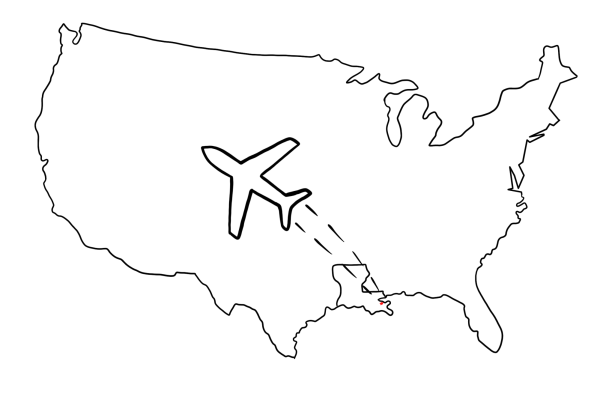
Tulane University students come from all over the country for a truly unique college experience, but so few want to stay after. Why?
Tulane boasts that the student population consists of 85% of people coming from at least 300 miles away. The class of 2027 mainly consists of Northeasterners, and only 22% of the freshman class are even from the central South. Only 12% of that class are from Louisiana.
It makes sense that most students don’t stay in New Orleans after college. Being away from family and friends is already hard for four years, especially when many people go to state schools that are a drive away from home. Most Tulane students come from huge cities, such as New York, Los Angeles, Chicago and Boston or their suburbs. These cities are bursting with job opportunities and seem like the logical choice. But even after choosing to come to Tulane, only 22% of students stay here after they receive their diplomas.
Migrating to larger cities post-college is a popular move, but graduates often maintain the idea that New Orleans isn’t a “realistic” option.
This city is known for being fun, a reputation to which parades, warm weather, relaxed culture and party scene all contribute. But it seems many Tulane students write off New Orleans as a post-graduation option because they think it’s just four years of fun. I have heard countless people say “New Orleans is a great place to go to college” but not to live. When asked why, people laugh and wonder how anyone could imagine being here beyond their college years.
The East Coast students will probably end up in New York, Boston or D.C., the West Coasters in Los Angeles, San Francisco or Seattle, and the Midwesterners in Chicago. Tulane’s alumni have some of the most geographically spread alumni movement patterns, which isn’t surprising given how far students come to attend this institution.
The New Orleans metropolitan area consists of over 1 million residents, and it has an unemployment rate of under 4%. New York, Los Angeles and Chicago all have roughly 1-2% unemployment rates above New Orleans. There isn’t a lack of job opportunities. Rather, many Tulane students come to this city to experience a little bit of what it has to offer, the “fun” parts, but fail to see there is more to the city than that.
New Orleans, despite its high crime rate, is highly liveable. Uptown is extremely walkable with restaurants, shopping and schools all accessible by foot. The weather is pleasant year-round, which Chicago and New York can not claim. The hot summers, high murder rate and drinking culture could be reasons Tulanians don’t see themselves here after college, but I think there is a deeper reason. Students from the East and West Coast often come from areas that look down on the South and don’t consider it a good place to live beyond college years.
Many Tulane students wish to indulge in the crazy parties, binge drinking and culture the city has to offer. When they toss their graduation hats, they decide it’s time for something more serious — somewhere that doesn’t have parades for every occasion, somewhere where you see more professionals in suits hailing cabs than street performers playing trumpet. But New Orleans’ lively culture shouldn’t disqualify it from being taken seriously.
The city’s unemployment rate being at a historic low of 3.6% means that there are over 175,000 jobs available in digital media, healthcare and logistics. Tulane was founded in 1834 as the Medical College of Louisiana and still has one of the top medicine programs in the country. Business is the most popular major at Tulane with over 22% of students majoring in something related to business or marketing. With so many jobs in healthcare and business, there are plenty of job opportunities for Tulane graduates. There are many benefits to staying in the city you go to college in. Many Tulane students intern in the New Orleans area, making it easier to get a job at the same company after graduation.
New Orleans is a city full of life, but is also a great place to start a new one. The city’s easygoing culture shouldn’t make it a nonviable option for a job post-college. Who knows, maybe four years of fun could turn into a lifetime of it.



